Serbia Facing Dual Risks To Security
By SETimes
By Bojana Milovanovic
Tensions that exploded into violence at the Jarinje border crossing on September 27th are the latest example of a worrisome trend, with potentially far broader implications. Serbian Defence Minister Dragan Sutanovac says what happens at the border could destabilise not only the former Serbian province, but beyond.
“I’m afraid that if it comes to violence in the north of Kosovo, it could be a prelude to problems in the wider region,” Sutanovac told the weekly Novi magazine in mid-September.
Asked whether the Serbian Army will protect Serbians, Sutanovac said that Serbia’s stand is to fight for Kosovo by peaceful and diplomatic means.
Serbian Police chief Milorad Veljovic agreed that tensions over the past few months represent a potential security risk. Nevertheless, he told SETimes that the problem of Kosovo is primarily a matter that should be resolved through diplomatic negotiation.
“The reaction of Kosovo or Serbian police forces can be counter-productive. Kosovo is a political problem and it should be handled that way. I hope that the international community and forces of EULEX in Kosovo will be responsive to it,” he added.
He points to organised crime as perhaps a more significant issue.
“Organised crime must not serve as an excuse for certain political problems and for not solving them,” Veljovic said, reiterating that organised crime does not recognise borders and therefore require comprehensive co-operation in the Balkans.
Marko Milosevic, an analyst with at the Belgrade Centre for Security Policy, does not expect the Serbian Army to participate in possible riots in Kosovo.
“Serbian policy now is not inclined towards that and I don’t believe that the army or the police will take part in Kosovo unrest. The army didn’t intervene during political unrest in northern Kosovo in 2004, and I don’t think it would now,” Milosevic told SETimes.
He points out that aside from the security risk for the citizens of Kosovo, another one dominates, perhaps more important – organised crime, including human trafficking and drugs.
“There is no direct co-operation between Serbian and Kosovo police; all the communication goes via EULEX. This facilitates criminal groups to organise well and unite, regardless of the nationality. Recently a human trafficking ring was broken up in Kosovo and those arrested were both Serbs and Albanians,” Milosevc added.
One other major security risk for Serbia, he told SETimes, is the economic situation.
“The unemployment rate that exceeds 20% is potentially a huge security risk. We’ve recently surveyed the citizens and a large percentage claimed to be ready to participate in social unrest and even violence,” he said.

